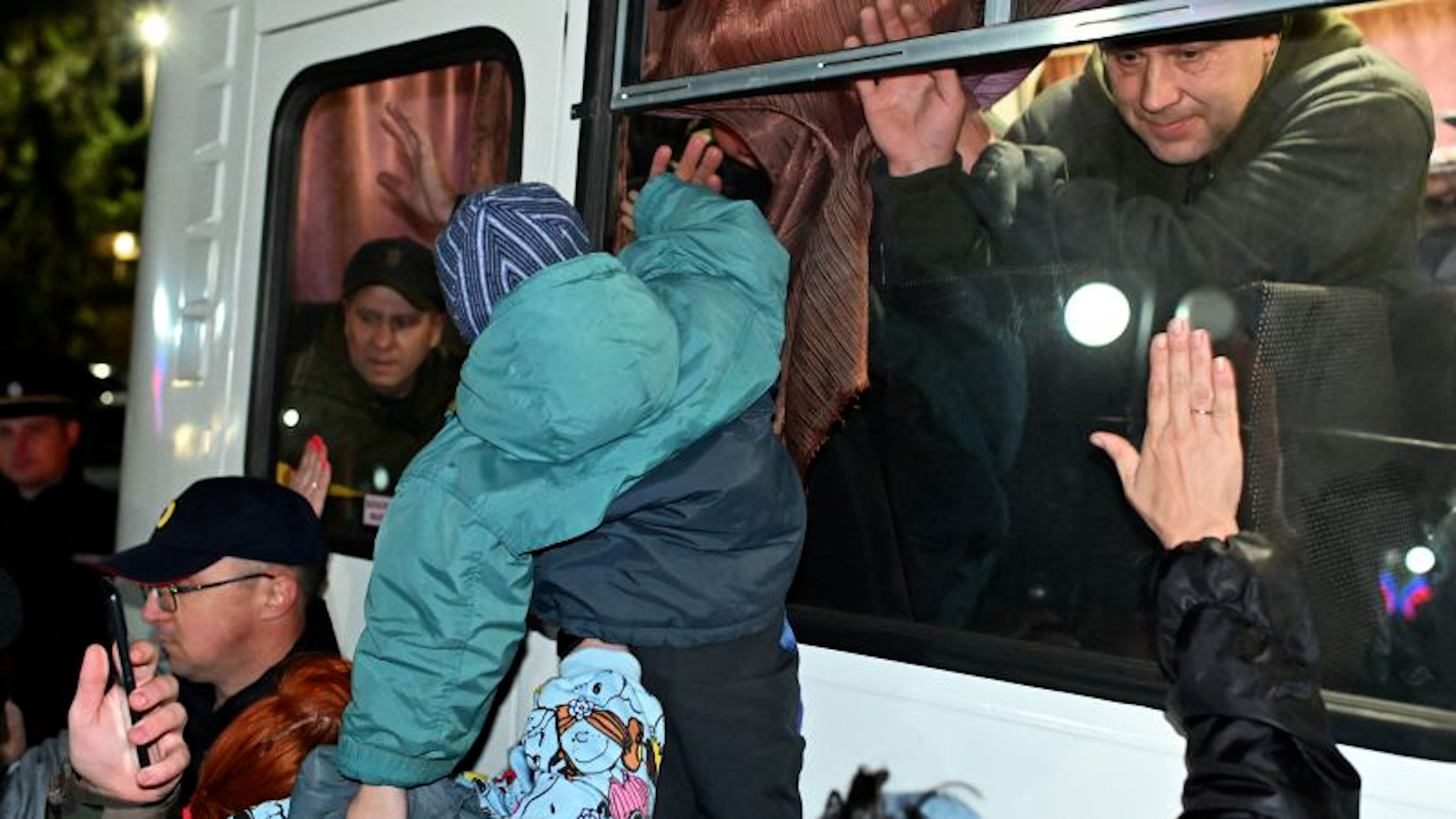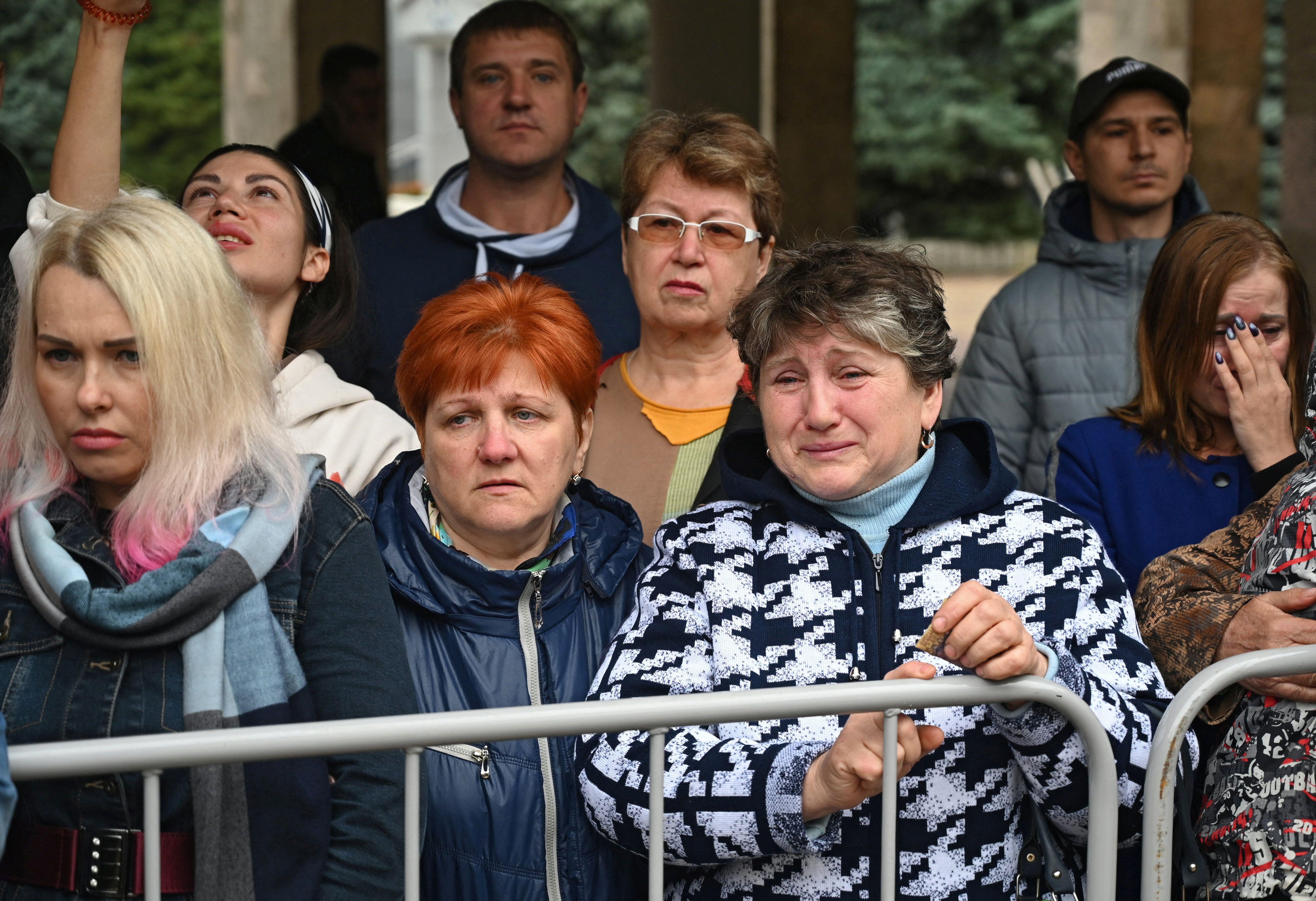
Sitrep: 'The law is being broken in every way' on mobilisation in Russia

Valentina Melnikova is a rights advocate and activist with decades of experience in holding the Russian state to account having founded the Committee of Soldiers' Mothers of Russia in 1989.
Melnikova has helped soldiers deal with the psychological aftermath of the war in Afghanistan and has personally tracked down missing soldiers in the Caucus mountains during the Chechen Wars.
Through her organisation, she helps military personnel, and their relatives, deal with Russian bureaucracy and military abuse.
- Russia's reserve: Its strength and how it's made up
- Putin 'not bluffing' about nuclear weapons as he calls up 300,000 reservists
- What is a 'dirty bomb' that Russia is accusing Ukraine of readying?
Since mobilisation was announced in Russia for the first time since the Second World War, she has been dealing with a flood of requests.
Forces News spoke to Valentina, Executive Secretary of the Committee of Soldiers' Mothers of Russia, about the role of the organisation since the Kremlin announced 'partial mobilisation' in September.
Watch: Sitrep – Dirty bomb or dirty trick?
– President Putin ordered the mobilisation of more than a quarter of a million Russians. Can you please explain how that works and what that means exactly?
VM: There are two processes going on right now. Firstly, the military action happening in Ukraine since the 24th of February. Secondly, the mobilisation in Russia.
The questions that we are dealing with are completely different. The number of requests that we get due to mobilisation is astronomically large, with several hundred requests per day.
We are dealing with questions from the men themselves and their relatives – who can be mobilised, and what rights do they have to defer mobilisation or be relieved of it?
The difficulty is that the process of mobilisation is not happening in accordance with the law on mobilisation nor is it in accordance with the laws on military duty.
People are not going through necessary medical checks before being sent to join military units.
– How are the Russian authorities acting unlawfully, as you say, with regard to conscription?
VM: This is an eternal problem to explain what is going on in Russia. The laws are being broken in every way. People are being notified incorrectly; draft papers that are being sent don't have legal standing.
Exemptions are given out improperly, even when people have the right to remain at home due to family responsibility, or if their employer has defined them as a key worker, or, of course, if they have health issues.
Most importantly, people are being sent to join the military who, according to the standards of the World Health Organisation, as is reflected in our documents, should be medically exempt.
– What happens to people who refuse to fight when they are conscripted?
– VM: It varies. Some don't show up, others flee abroad. I can't generalise.
Every family and every man reacts in different days. Some turn up to the conscription centre and join the frontline. Some try to appeal, while others go into hiding.
– In what way are you able to help?
– VM: There are so many requests and the people who get in touch are not minors, some of them are forty and older. We guide and direct them towards their local representative, who all can be reached online. It is important to register your claim in writing so that it can be legally appealed.
– Do you have any idea how successful you are in supporting people who appeal against being conscripted?
– VM: Because the figures are in their thousands, I honestly can't quantify the cases that are successful and those that are not. But when a person tries to protect themselves, it is better.
– The Kremlin has admitted errors in the mobilisation programme. What does it mean by that and how significant do you think that is?
VM: These are not mistakes. It’s a violation of the law. It’s a polite way of putting what we call in Russian 'legal nihilism' – a denial of the law. These are not mistakes at all.
– And has this given a significance that they might change what they are doing?
VM: Well, in some cases it became possible to return some people from the military units. But it is far from everyone who still needs to be returned.
It is all tied to how the orders are being executed by the military commissars depending on exact or vague orders of the Ministry of Defence. It varies.
Many people who should not have been mobilised in the first place are still there, including the medically unfit. Now I am getting calls from soldiers and officers with severe illnesses who are currently on the front. There is no opportunity to help them.
– Does your work and public opinion make a difference in the Kremlin's decisions, do you think?
– VM: Surprisingly to us, our activities do have an influence. Because there were so many complaints to our committees in the first days of the mobilisation and my colleagues so energetically addressed various authorities including their municipal deputies and senators that the state had to admit that not everything is happening in accordance with the law and to start to rectify it. It was truly astounding.

– You have outlined a situation where Russian people are being forcibly sent to Ukraine who may not be fit or may not want to go, do you know much about the conditions in which they are having to fight in?
– VM: It varies. However, the story of the day-to-day life on the front is tough, there are a lot of people, and the conditions vary, there are trenches and life on the frontline is hard. There are complaints. Communication with the soldiers and officers who are in Ukraine is almost non-existent. Usually, the ones that turn to us are the relatives or friends, notifying us on who needs medical assistance, or clothes and shoes. Of course, there is that but I am unable to describe it because it's a completely different way of life which very different problems.
– Valentina, you take a personal risk in speaking out on this. Why do you do it?
– VM: I would not say it is such a risk. In February and March, it was strange to have to remember about military censorship, not to say certain words and not to talk about certain happenings. That was difficult for me because I have 33 years of experience in giving interviews. It was a big strain for me.
But we are talking about the issues that people put forward to us and what we as an organisation. That is our mission and or goal and in it there is nothing unlawful.
So, yes, I have to watch what I say, and we ask journalists, especially ones that write to show their text before it is published.
In general, I can't say that we are especially scared. We are independent and that is the power of Soldiers' Mothers Committee.
– Is there anything that you would like to add?
– VM: As always, I would like to ask for support because this conflict of Russia and Ukraine for me, personally, is a huge tragedy because I have close relatives living in Ukraine – my nephews and cousins – and what is happening to them is very difficult for me to bear.
I have friends there with families who have suffered. Some have managed to leave. For me, it is a personal sorrow.
We ask that concentrated efforts are made by public organisations abroad and, of course, heads of state. The whole world missed the beginning of this military operation in 2014 in Donbas, no-one was paying attention, and now we have this tragedy and nightmare on our hands now...
Without a doubt, we cannot let the population of such a huge and prosperous country such as Ukraine suffer in this horrific way, to be constantly under the threat of complete and utter destruction.
I want to remind all that the Russian nuclear strategy allows for the use of nuclear weapons, by no means should this be allowed to happen.









